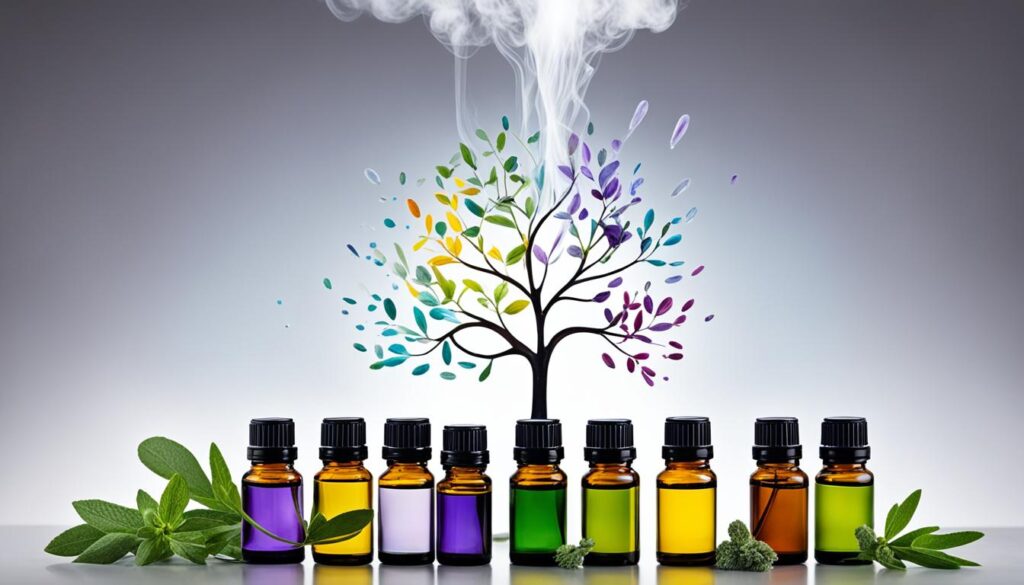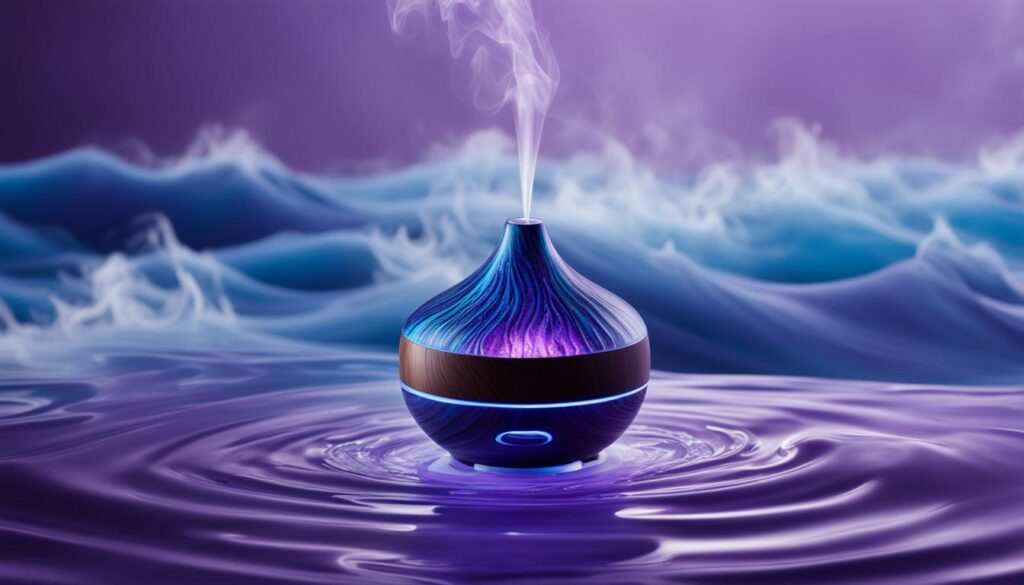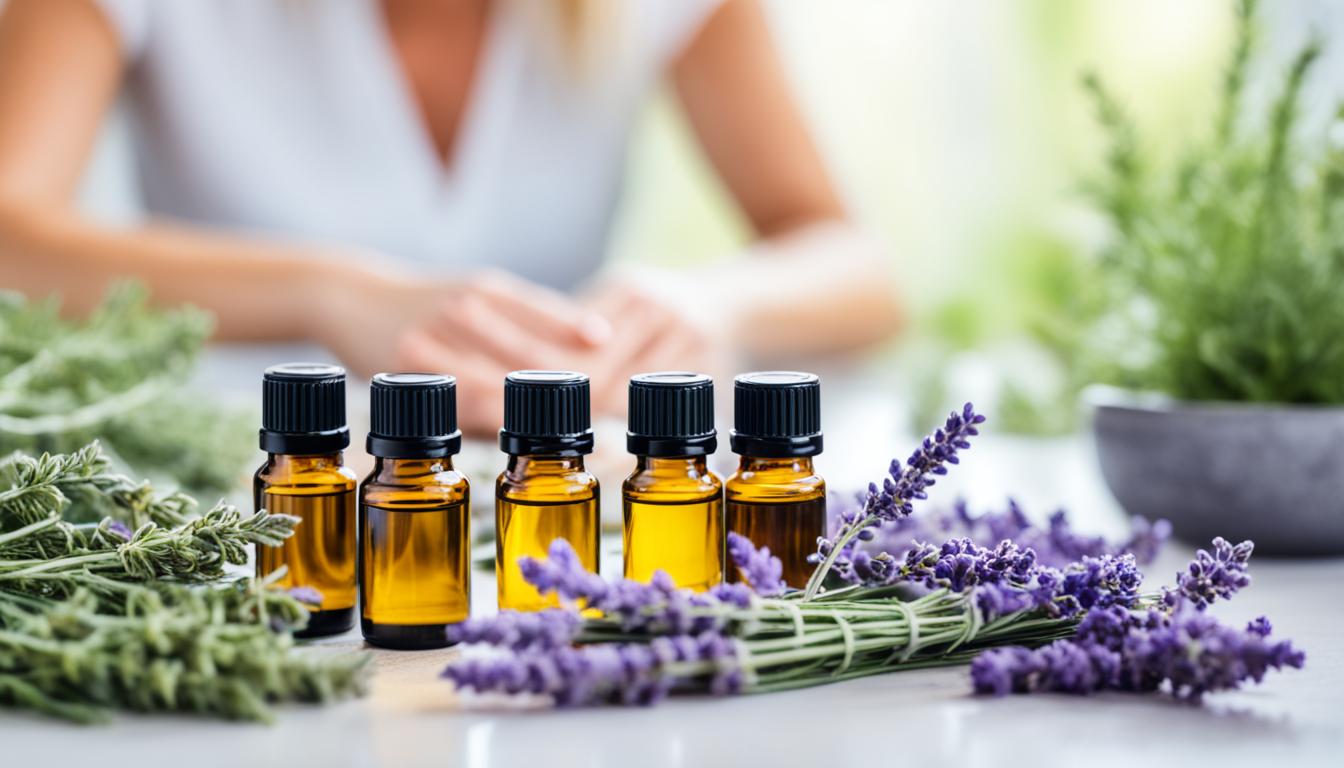“The greatest wealth is health.” — Virgil
In the battle against Obsessive Compulsive Disorder (OCD), finding peace can be hard. Essential oils serve as a natural ally in this fight, offering solace and relief. These oils have been valued since ancient times for their positive impact on the mind and spirit, providing a natural way to find balance and harmony.
Starting your journey with essential oils for obsessive compulsive disorder relief begins now. We combine ancient wisdom with modern studies to show you the way. Explore how these natural scents can support your well-being and peace of mind.
Key Takeaways
- Discover the historical and modern application of essential oils for mental health.
- Learn about the specific essential oils that offer natural relief for OCD.
- Understand the potential role essential oils have in complementing traditional OCD therapies.
- Gain insights into how to integrate essential oils into your OCD management for holistic well-being.
- Comprehend the importance of safe usage and application of essential oils for obsessive compulsive disorder.
Understanding Obsessive Compulsive Disorder and Its Challenges
It’s important to fully understand OCD to tackle its challenges. Exploring the depths of OCD helps us give better support and find more effective ways to manage it.
Hyperactivated Stress Responses in OCD
People with OCD deal with an overactive stress response. This constant stress triggers the cycle of obsessions and compulsions. It makes finding peace hard and shows why we need specific treatments.
Persistent anxiety in OCD is not simply a matter of excessive worry; it’s a physiological and psychological tug-of-war that underscores the challenges of OCD. This fear causes the repeated behaviors, even though they don’t actually help.
Common Misconceptions and Diagnosis Difficulties
Misunderstanding OCD can lead to wrong diagnoses. This hides the real struggles of those with OCD. They might be seen as just picky or overly clean, making them suffer alone.
Realizing the risk of not diagnosing OCD correctly is crucial. This ensures we don’t downplay OCD’s effects. Recognizing this helps us care for and support people with OCD better.
Rising Incidence of PANDAS/PANS and Its Relation to OCD
The increase in PANDAS and OCD cases is worrying. It links strep infections to sudden OCD symptoms in kids. This adds another complex layer to understanding OCD.
Knowing about the autoimmune aspect of PANDAS and OCD has expanded research. We’re learning more about what OCD really involves.
Addressing these special aspects of OCD needs a comprehensive approach. This approach should respect both its mental and physical complexities.
To truly help those with OCD, we need to bridge understanding and action. Learning all about OCD is a crucial, patient journey that can improve lives significantly.
| Challenges of OCD | Impact on Individuals |
|---|---|
| Hyperactivated Stress Responses | Contributes to the persistence of obsessive and compulsive behaviors |
| Common Misconceptions | Delays in diagnosis and misinterpretation of symptoms |
| Rising Incidence of PANDAS/PANS | Autoimmune-driven abrupt onset of symptoms, leading to heightened parental concern and need for specialized care |
| Stigma and Lack of Awareness | Fueling isolation and interfering with seeking appropriate treatment |
Understanding OCD helps us create a supportive environment for those affected. This knowledge leads to empathy, better care, and the benefits of interventions.
The Therapeutic Role of Essential Oils in Mental Health
Since ancient times, people have used essential oils for healing. These powerful plant extracts mix old traditions with new research. They show us how they can improve our mental health.
Historical Use and Modern Resurgence in Aromatherapy
For years, cultures around the world have valued essential oils. Today, aromatherapy is making a comeback. It blends tradition with science, showing how these oils help our minds and emotions.

The Science Behind Aroma and Brain Function
The link between smell and brain function is strong. When we breathe in essential oil scents, they affect our brain. Specifically, they reach the limbic system, our emotional center. This can change how we feel mentally and emotionally.
Impact of Essential Oils on Emotions and Cognitive Processes
Essential oils can change how we feel and think. Studies show that certain scents can improve our mood and clarity of thought. Adding essential oils to our routine can make a big difference.
Essential oils do more than just smell nice. They are powerful tools for mental and emotional health. By combining ancient wisdom with modern science, we find natural ways to support our minds.
Essential Oils for Obsessive Compulsive Disorder
Exploring natural ways to handle Obsessive Compulsive Disorder (OCD) often leads you to try aromatherapy. Essential oils for OCD are seen as a possible way to ease symptoms. These oils are known for their calming effects from nature’s most soothing extracts.
Lavender is top-rated for managing obsessive thoughts due to its soothing effects. Lemon balm, known for its gentle calming quality, helps lessen anxiety that feeds compulsive behavior. Frankincense is also key for its ability to stabilize mood swings, making it very useful for wellbeing.
deserves a mention for its role in calming essential oils for OCD relief. It’s known for its stress-relieving properties. Using these essential oils daily might lower the impact of OCD’s disruptive behaviors.
- Lavender – Calms and soothes
- Lemon Balm – Reduces anxiety with sedative effects
- Frankincense – Grounds and balances mood
- Ylang Ylang – Promotes relaxation and eases stress
Regular use of these oils can offer relief and add to a peaceful lifestyle. They help you find calm from OCD’s challenges. Remember, essential oils should aid, not replace, standard therapies in a full OCD treatment plan.

Maximizing the Benefits: How to Use Essential Oils for OCD
Adding essential oils to your wellness routine can change how you manage anxiety and OCD. To make the most out of them, learn how to apply them best for your needs. We’ll look at how to use them for lessening anxiety, why you should dilute them for skin use, and ways to make aromatherapy more personal.
Methods of Essential Oil Application for Anxiety Management
Inhalation is a great way to start using essential oils for easing anxiety. Use diffusers to spread the oil’s scent, making a space more relaxing. Portable inhalers or simply smelling the oil from the bottle can also quickly lessen stress. These methods help you quickly feel the calming effects of essential oils when you need them.

Diluting and Applying Oils for Topical Use
When using essential oils on your skin, it’s important to dilute them. Mix them with a carrier oil, like jojoba or coconut oil, before applying. For adults, a good mix is 6-12 drops of essential oil per ounce of carrier oil. Apply this blend to places like your wrists, feet, or tense areas. Diluting essential oils reduces skin reactions and makes the oil’s benefits last longer.
Personalizing Your Aromatherapy Experience
Aromatherapy is very personal. To make it yours, find which scents help your mental state. Use blends or single oils that fit your mood and needs. Try adding oils to a bath or making a roll-on for use anywhere. Since everyone reacts differently to essential oils, explore to see what suits you best. Adjust your approach as you learn what works.
By carefully using essential oils for anxiety management, making sure to dilute essential oils for topical use, and personalizing your aromatherapy experience, you can naturally help manage OCD. Dive into this journey and let these oils guide you to a more peaceful and focused mind.
Essential Oils Safety and Precautions
Exploring essential oils for mental health requires knowing their benefits and safety. Essential oil safety is key for a good aromatherapy experience, especially in managing obsessive-compulsive disorder (OCD).
Always do a patch test before using an essential oil on your skin. This step checks for bad reactions to keep your skin safe. After testing, use carrier oils to dilute essential oils. This protects your skin from the strong effects of pure essences.
Patch Testing and Carrier Oils: Ensuring Topical Safety
A patch test is critical before you fully use an essential oil, especially if it’s new to you. Mix a little essential oil with a carrier oil and put it on a small skin area. Then, wait 24 to 48 hours to see if there’s any irritation or allergic reaction.
Good carrier oils include jojoba, coconut, or sweet almond oil. These oils help dilute the essential oil and can also benefit your skin.
Interactions and Contraindications: Consulting Healthcare Providers
Because essential oils are potent, they can interact with other meds. That’s why talking to a healthcare provider is a must. They can advise you on any risks or interactions, helping you use oils safely.
Understanding the Limitations of Essential Oils: Complementary Use Only
Essential oils are helpful for mental health but have their limits. They should be part of a broad approach to managing OCD. This means using them along with treatments your doctor suggests. Essential oils are not a stand-alone cure.
Conclusion
In this review of essential oils for OCD, we’ve learned about OCD and the benefits of essential oils. It’s vital to see that managing OCD has many parts. Adding essential oils to your daily life can help ease your mind and offer some control.
Though essential oils alone can’t solve everything, they do offer comfort. Oils like lavender and frankincense are known for helping you feel calm. Make sure to use them safely and talk to a doctor, especially if you’re following other treatments.
Remember, essential oils should support, not replace, professional medical advice. They can provide extra help and empowerment. Including essential oils in your OCD care is a positive step. It helps improve your mental health and your overall happiness.




